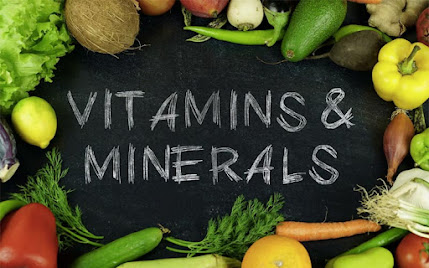Vitamins and minerals are essential nutrients that play critical roles in maintaining health, supporting bodily functions, and preventing diseases. Unlike macronutrients such as proteins, carbohydrates, and fats, vitamins and minerals are needed in smaller amounts but are equally vital for optimal well-being.
What Are Vitamins and Minerals?
Vitamins: Organic compounds that assist in various metabolic processes. They are either water-soluble (e.g., vitamin C and B-complex vitamins) or fat-soluble (e.g., vitamins A, D, E, and K).
Minerals: Inorganic elements that contribute to structural and regulatory functions, such as building bones, maintaining heart rhythm, and supporting enzyme activity. Examples include calcium, iron, magnesium, and zinc.
Key Functions of Vitamins
Vitamin A:
Promotes healthy vision, skin, and immune function.
Sources: Carrots, sweet potatoes, spinach, and dairy products.
Vitamin C:
Supports immune health, acts as an antioxidant, and aids in collagen production.
Sources: Citrus fruits, strawberries, bell peppers, and broccoli.
Vitamin D:
Enhances calcium absorption and supports bone health.
Sources: Sunlight exposure, fortified foods, and fatty fish.
Vitamin E:
Protects cells from oxidative stress and supports skin health.
Sources: Nuts, seeds, spinach, and vegetable oils.
Vitamin K:
Essential for blood clotting and bone metabolism.
Sources: Leafy green vegetables, broccoli, and fermented foods.
Key Functions of Minerals
Calcium:
Builds and maintains strong bones and teeth.
Sources: Dairy products, leafy greens, almonds, and fortified plant-based milk.
Iron:
Vital for red blood cell production and oxygen transport.
Sources: Red meat, beans, lentils, and fortified cereals.
Magnesium:
Supports muscle and nerve function, regulates blood sugar levels, and contributes to bone health.
Sources: Nuts, seeds, whole grains, and dark chocolate.
Zinc:
Boosts immune function, aids in wound healing, and supports cell division.
Sources: Shellfish, beef, pumpkin seeds, and legumes.
Potassium:
Maintains fluid balance, supports muscle contractions, and regulates blood pressure.
Sources: Bananas, potatoes, oranges, and spinach.
Benefits of Proper Vitamin and Mineral Nutrition
Disease Prevention:
Adequate intake reduces the risk of chronic conditions such as heart disease, osteoporosis, and certain cancers.
Enhanced Energy Levels:
Vitamins like B12 and iron play a role in energy metabolism and reducing fatigue.
Stronger Immunity:
Nutrients like vitamin C, zinc, and vitamin D fortify the immune system against infections.
Improved Mental Health:
Minerals such as magnesium and vitamins like B6 and B9 are crucial for brain function and mood regulation.
Tips for Optimal Vitamin and Mineral Intake
Eat a Balanced Diet:
Focus on whole foods, including fruits, vegetables, lean proteins, whole grains, and healthy fats.
Diversify Your Plate:
Include a variety of colorful foods to ensure a broad spectrum of nutrients.
Consider Supplements:
Use supplements if advised by a healthcare professional, especially for deficiencies or specific needs (e.g., prenatal vitamins).
Limit Processed Foods:
Processed foods often lack essential nutrients and may contain harmful additives.
Stay Hydrated:
Water aids in nutrient absorption and overall bodily functions.
Conclusion
Vitamins and minerals are fundamental to maintaining a healthy, vibrant life. By prioritizing nutrient-rich foods and addressing any deficiencies, you can optimize your health and prevent potential health issues. Remember, balance and consistency are key to reaping the long-term benefits of proper vitamin and mineral nutrition.

Comments
Post a Comment